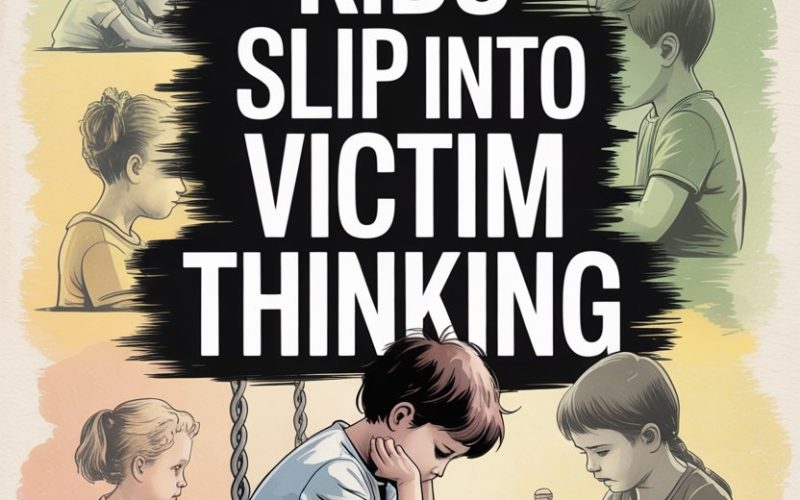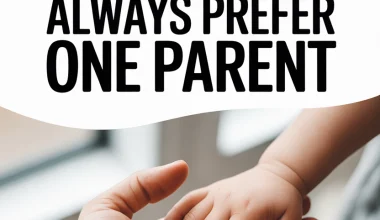Ever found yourself listening to a child’s dramatic retelling of a playground spat and wondered when your living room turned into a courtroom?
Kids are amazing, but sometimes they seem to have a PhD in “Why Everything Is Unfair 101.”
Victim thinking pops up in even the happiest homes, sneaking in and convincing your otherwise brilliant offspring they’re powerless and hard done by.
The good news: with a little know-how (and maybe caffeine), you can help them trade in their “Woe is me” badge for something a bit more uplifting.
Here’s how kids fall into that mental trap—and what you can do tonight to help them climb back out.
1. Spotting Every Slight as a Personal Attack
Nothing gets the drama flowing quite like a child convinced their sibling’s ice cream scoop is strategically larger than theirs—clearly, it’s a conspiracy.
When kids believe every mishap is a direct strike at them, it’s easy for them to feel perpetually wronged.
How to help:
Model curiosity instead of accusation.
When your child insists, “Mum always lets Emma stay up later because she loves her more,” try this: “That sounds pretty rough. Do you think there could be another reason Emma’s bedtime is different tonight?”
Encouraging your child to consider other explanations gives them practice in thinking outside their emotions.
Research from Stanford University shows that reframing situations—even small ones—can help children build resilience and empathy.
Try making it a game: “Let’s play detective and find three other reasons why this happened!” Sometimes, the truth is less “villain plot” and more “Dad forgot whose turn it was.”
2. Catastrophising Small Setbacks
A lost sock? The end is nigh. Didn’t get picked for the school team? A lifelong curse of mediocrity.
Catastrophising is an Olympic sport for some kids, and it’s a surefire way to feel like the universe has it out for you.
How to help:
Name the feeling, then shrink it down to size. “Sounds like you’re really upset you didn’t get picked. That stings.” Then gently ask, “Is this something that will matter a week from now? Or when you’re as old as Nana?”
Most things seem less mountain-sized when you point out the perspective.
Cognitive behavioural techniques, like those recommended by child psychologist Dr. Dawn Huebner, encourage kids to separate thoughts from facts.
A little gentle humour helps too: “Last week you thought we’d all perish because your favourite spoon was in the dishwasher, remember?” (Delivered with a wink, not an eye roll.)
3. Blaming Others for Every Problem
Nothing says “victim thinking” quite like a child blaming their sibling, the teacher, the dog, and possibly the Prime Minister for a forgotten lunchbox.
If everyone else is always at fault, your child never has to wrestle with their own role.
How to help:
Gently guide your child to reflect on their choices. “It’s easy to blame others when things go wrong, but let’s think—what was your part in this?”
Create a family culture where mistakes are just part of the learning process, not something to hide or pass off.
According to Professor Carol Dweck’s research on growth mindset, children are more likely to take responsibility and bounce back when parents normalize mistakes as a crucial step in learning.
You’ll know you’re getting through when you hear, “Well, I guess I could have packed my own bag this morning…”
4. Expecting Rescue at Every Turn
The classic “I can’t find my shoes—help!” even though they’re sitting directly in plain sight. Or “I didn’t get a turn, so you need to fix it!”
When kids believe adults should swoop in and solve every inconvenience, it cements a sense of helplessness.
How to help:
Empower rather than rescue. Instead of leaping into action at every minor hiccup, get curious: “What have you tried so far?”
Offer support, but resist the urge to fix things for them unless it’s truly urgent (like, say, a small fire—not a missing left trainer).
Research from the University of Washington highlights that kids who practice small acts of problem-solving develop more confidence and independence.
Bonus: it gives you a break from shoe-hunting duty.
5. Repeating Negative Self-Talk
“I’m just bad at maths.” “Nobody wants to play with me.”
When these phrases become a child’s greatest hits, it’s a sign that victim thinking has moved in and unpacked its bags.
How to help:
Interrupt negative self-talk the way you’d stop a runaway shopping trolley. “Hang on, just because you struggled with one maths problem doesn’t mean you’re bad at all of them.”
Encourage specific, truthful feedback: “You found that one hard, but you’ve solved plenty before.”
Clinical psychologists suggest encouraging children to talk to themselves the way they’d talk to a mate.
No one tells their best friend, “You’re rubbish and no one likes you.” (At least, no one you should invite to your child’s next birthday party.)
Try asking: “What would you say to a friend in your shoes right now?” Help your child develop a new, more compassionate inner script.
6. Retelling Stories Where They’re Always the Underdog
Some children have a knack for spinning every story so they come out as the long-suffering hero—no matter how many times the plot repeats. (“And then, guess what happened? They still didn’t pick me!”)
How to help:
Invite your child to be the narrator, not just the star. “That sounds tough. What do you think you could do differently next time?”
Encourage them to brainstorm possible actions for next time, instead of just rehashing the injustice.
Psychologist Dr. Lisa Damour suggests prompting your child to look for patterns: “Have you noticed this happens a lot at lunchtime? What might you try tomorrow?”
When kids shift from rehashing woes to scripting new endings, it puts them back in the director’s chair.
7. Avoiding Responsibility “Because It’s Unfair”
Nothing triggers a dramatic sigh quite like being asked to put away toys “when it’s not even my mess!” Dodging chores or schoolwork with an “it’s unfair” chorus is classic victim thinking—complete with jazz hands.
How to help:
Set clear expectations and stick to them, but listen for signs your child genuinely feels overburdened. “I hear you—cleaning up can be a pain. What’s a fair way to share jobs around here?”
Sometimes, a family “job jar” or a rotating chore chart can transform martyrdom into teamwork.
Experts recommend offering choices where possible (“You can set the table or feed the cat—pick one”) and leading by example: “Even grown-ups have jobs we don’t love, but we do them because we’re part of the family.”
Bonus points for singing into the mop.
Raising Resilient Kids—One Drama at a Time
Victim thinking isn’t a character flaw—it’s just a mental pothole on the road to growing up. Every child trips into it now and then (and, let’s be honest, plenty of adults do as well).
What matters is how you respond: with patience, humour, and a toolkit full of gentle nudges back toward resilience.
You don’t need to turn every grumble into a teachable moment, nor do you need to squash every complaint. Some days, just listening and offering a snack is more than enough.
But helping your child recognize when they’re stuck in “everyone’s out to get me” mode—and teaching them there’s always a way forward—might just be the best gift you give them this year.
Besides, you’re raising future adults. Better to send them out into the world with problem-solving skills and a healthy sense of perspective… than with a collection of medals for Most Dramatic Sighs Per Annum.
Now, about that missing sock…




